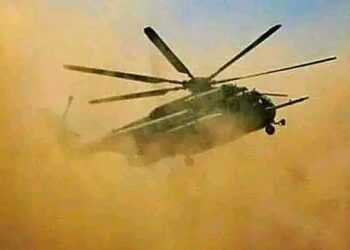By Binta Shama
Abuja
Executive Vice Chairman/Chief Executive Officer National Agency for Science and Engineering (NASENI) Dr. Bashir Gwandu has called for stronger collaboration with the Air Force Institute of Technology (AFIT) Kaduna, Kaduna state for the smooth take-off of the permanent site of Aeronautics and Air Vehicle Development Institute (AAVDI), an Institute under NASENI.
The institute is located within AFIT complex in Kaduna.
The NASENI boss who disclosed this on Wednesday when the new Commandant of AFIT, Air Vice Marshal (AVM) S.L. Rabe paid him a courtesy visit at NASENI headquarters Abuja, congratulated the new AFIT boss on resumption of duty.
AVM Rabe came to NASENI with AFIT Provost, Professor Dauda Mohammed; Director, Quality Assurance, AFIT, Dr I. Yahuza and Director of Projects, AFIT, Group Cpt Ahmed. He said his visit to NASENI was to congratulate the EVC on his appointment as well as touch base with him on the collaboration for the establishment of NASENI Institute in Kaduna.
He said it was an honour and he looked forward to strengthening ties with NASENI to develop AADVI and also fast track the on-going work on made-in-Nigeria helicopter.
Dr. Gwandu informed him that he was barely two months on the job since his appointment and that he has been visiting NASENI Institutes to see what some of them are doing.
“Surely, our work with the Air Force and the military establishment are areas that I want to focus on because there are some of our key projects that AFIT is championing and that cooperation is very important to us in particular and to the country.”
He said the main reason for having the helicopter and the AAVDI is for Nigeria to be self-reliant in aviation technology, noting that there will be manufacturing of components for the helicopter and other aircrafts that NASENI can produce. “We can train people to learn to produce the components. “Iike I said, we have been looking at different components of aircrafts in particular and how we can penetrate that industry.
“We produce a lot of titanium in this country, as we know the body of aircrafts in particular use composite materials which do not work with aluminum as we all know because of corrosion. One of the key projects I am working on is getting a team to work on Titanium.
“I have companies that I am talking to courtesy of your colleague at NASENI. We will work with what we have to produce some of the parts. We have Institutes like HEDI in Kano that produce hydraulics that is needed in aviation. We are trying to form a team that we can train in different areas of aerospace such as satellites, down to aircraft aviation.
.




